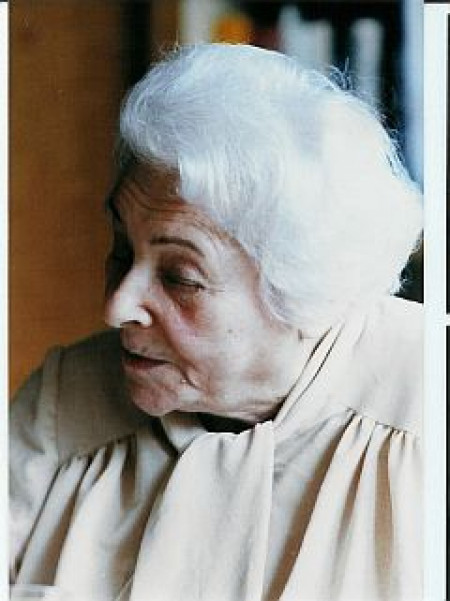
9 December 1900, Komárom – 8 July 1985, Budapest
The name of Mrs Miklós Máthé – or, as everyone knew her, Auntie Klári – has almost become a concept. She was one of the most outstanding musician-pedagogues of the 20th century, who taught countless famous and less famous fine Hungarian musicians, an admirable representative of a great generation. She spent all her life, virtually to the last moment, with creative work, enriching all those to whom it was given to be close to her colourful, vibrant personality. Perhaps boundless energy was the secret of her eternal youth, because she was very young, younger than any of us, even at the age of eighty-five. She devoted sixty-five years of her life to teaching.
Since her mother was an excellent pianist, she was surrounded by music from her childhood onwards. At fifteen she became Arnold Székely's pupil at the Music Academy. Having graduated with honours, she spent a few years in the Netherland. She gave successful concerts, but was never satisfied with her performances. She wanted to know more. So she came home and spent some "wonderful years" studying with Leo Weiner and Margit Varró. She not only learned the "profession" from them at the highest level, but also acquired an example as a pedagogue, which determined her own habits as a teacher in the years to come. For three years she met Leo Weiner and Margit Varró every Thursday to engage in the study of analytic harmonics. On Tuesdays they analysed the Beethoven symphonies in Liszt's transcription for two pianos. Her relationship to Varró was more than that of a pupil and fellow artist: they were close friends as well. In her home she met exciting people, the crème of social, musical, artistic and literary life. That was how she met Frigyes Karinthy, Kosztolányi, Radnóti, Aladár Rácz, Milán Füst and others. By this time she also taught - private pupils, since there was no other possibility. She was always passionately interested in teaching. That was when she learned to get "water out of stone". ("I had paying pupils and talented pupils.")
In 1945 she and Erna Czövek founded the Work Community of Private Music Teachers. She was one of the authors of the first Hungarian Piano School. When in 1948 the Béla Bartók Specialist Music Secondary School was established, she was appointed a teacher there, but at the same time was also given a post at the Music Academy, where she led the teaching practice of future teachers and taught didactics. Her pupils included, among others, Dezső Ránki, Csilla Szabó, Attila Némethy, Árpád Joó, Gyula Kiss, Balázs Szokolay, Péter Nagy, Gábor Csalog, Balázs Kecskés, Attila Pertis and Gergely Bogányi.
Auntie Klári always said: teaching is just as much an art as performing on a stage. "The pianist gives his art for a short while to a great many people, whereas a good teacher gives his or her art over a very long time to just a few people." The faith in the inherent talent of the children entrusted into her care was an essential part of her teaching. "Learn music from yourself! Play on the piano what you feel; you want to hear from others what you sing!" She not only said this, but acted accordingly. She always led the pupils unobtrusively, allowing them to have the excitement and pleasure of discovering the solutions for themselves. She professed that the greatest pleasure that work could give is when the student excelled the teacher. The good teacher is one who sooner or later makes himself or herself superfluous. Aunti Klári succeeded in having the children experience the tasks solved as their own successes, and thus, becoming confident as regards their talent and strength, look forward with excitement to the next, perhaps more difficult, steps. Her lessons had a good-humoured tension; her vibrant personality and her friendly, playful relations with the children created an atmosphere which made the joint work supremely effective.
The pupils who have already completed their studies also kept returning to her, for advice, help, or if nothing more, a little gossip. At Christmas and on her birthdays, at times as many as ten or twenty "children" got together in her flat. Aunty Klári's husband, the also eternally young Uncle Miklós, or as the children impishly called him behind his back, "Uncle Klári", was in his element at such times. These young people were his children as well, he shared their happiness or sadness, just as Auntie Klári did.
In the last five years of her life, I was given the wonderful gift of being able to be near her day by day, as her assistant. Nonetheless, it is difficult to sum up her secret. The magic of her personality, her wonderful ability to give something new, something different at every lesson, her vast experience and knowledge, the ability to connect momentary intuition with conscious work: all these together. But for me, she remains in my memory as a good, fairytale miracle-making magician.
Zsuzsa Esztó


